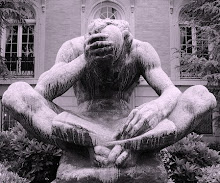My wife and I are watching Obama's infomercial just now--not sure why since we've already voted a week ago. In the live portion at the end of the 30-minute, Obama appealed to Americans to vote for him and "to choose our better history."
Now that's some soaring rhetoric, but there's something more interesting going on. Well, at least more interesting for us medieval dorks over at ITM. Earlier, we were talking about the place of the medieval past in the present (and vice versa), and Obama's phrasing struck a cord for me in relation to that subject. I oscillate between two strand of thought:
1) What I want to learn, which I would place in the Foucauldian, archaeology-of-knowledge school which sees a Thing to be discovered—perhaps forgotten, perhaps repressed, but still Something. This is, I think, present in his early work on madness and civilization, and it is certainly there in his last writings on the history of sexuality.
2) And the other strand is what I want to do, which is certainly in line with a Marxist methodology, though not necessarily its ideology. I want, like John Berger said in Ways of Seeing, to view the past not as a thing to be recovered but as a “well of conclusions from which we draw in order to act.” (Berger may have been cribbing from Benjamin, but the latter never said it so well.) And how do we act upon the past? I’d follow Howard Zinn who, in the initial chapter of A People’s History of the United States, wrote “If history is to be creative, to anticipate a possibly future without denying the past, it should, I believe, emphasize new possibilities by disclosing those hidden episodes of the past when, even if in brief flashes, people showed their ability to resist, to join together, occasionally to win. I am supposing, or perhaps only hoping, that our future may be found in the past’s fugitive moments of compassion rather than in its solid centuries of warfare.”
I had a Latin teacher at the University of Texas one time who—after receiving his PhD in classical civilizations—told me that the humanities were one big Ponzi scheme. He wondered (rightly I think) what the point of all this work was if his job was then to teach others to essentially do the same thing he’d just done. It’s a pyramid scheme in that sense, but in some ways I see it more along the lines of non-productive, masturbatory work. Work of this kind is not at all creative and turns back to itself for meaning and legitimacy.
But that is only tru if we ignore Zinn’s desire for history to be creative. Certainly the idea is not new; Thucydides espoused it in his History of the Peloponnesian War way back in the fourth century BC. He said that he hoped his words would “be judged useful by those who want to understand clearly the events which happened in the past and which (human nature being what it is) will, at some time or other and in much the same ways, be repeated in the future”; that has, of course, become crystallized and clichéd into the slogan “those who do not learn from history are doomed to repeat it.” Perhaps that is a commonplace, but Zinn-like (...get it?) generative history has a chance to not just steer us in the right direction, but to create our destination and course. In some ways what Zinn is proposing is not a passive role in the unfolding of historical events and then making the right “choice” when confronted with it; rather, it is an active interaction with the past that can help us to re-vision our present and change the choices with which we might be faced.
That is what I heard from Obama this evening. An appeal to generative, creative history that he thinks can move the country forward. That, to me, is a great hope for this administration. It probably won't be some Kennedy-esque central figure that controls all with his charisma; it may just be a way to revive our country by revising our history.
Of course, the astute folks in my hometown of Waco, TX--especially David B. Anderson and Mike James--have known this all along!
Subscribe to:
Post Comments (Atom)

No comments:
Post a Comment